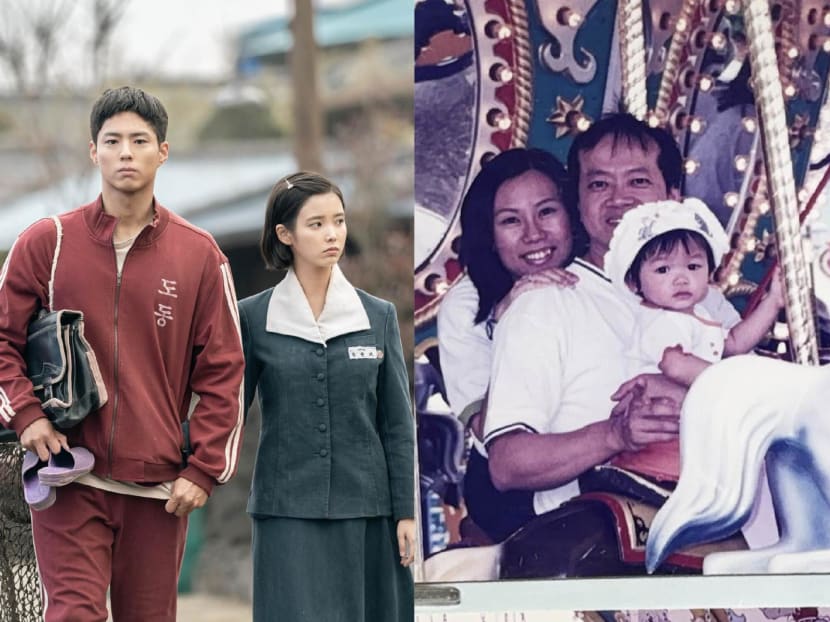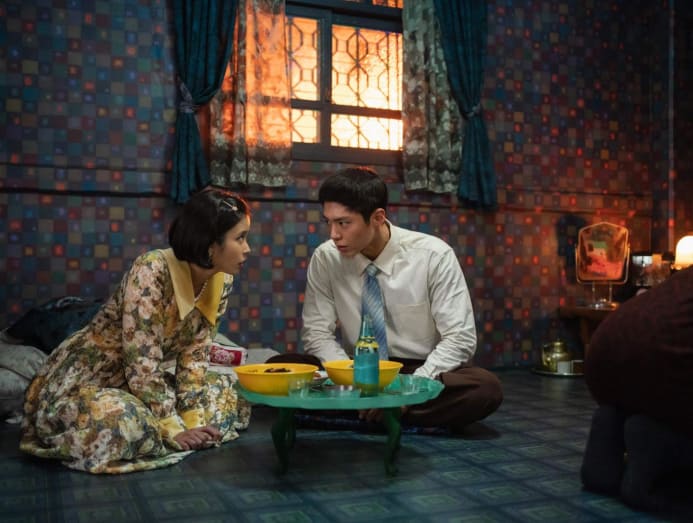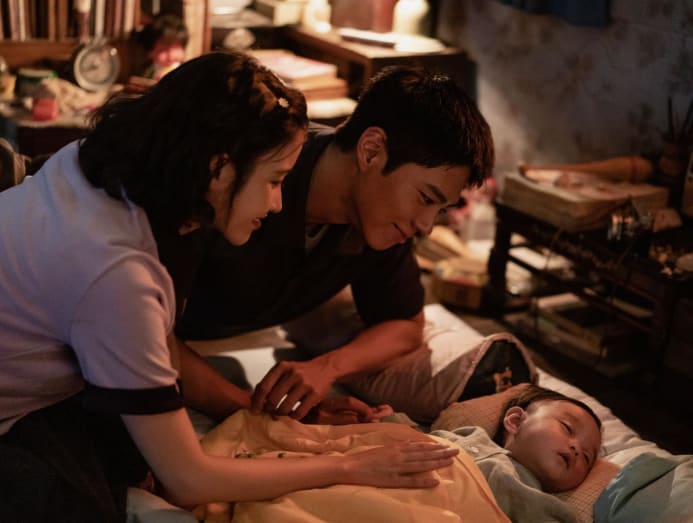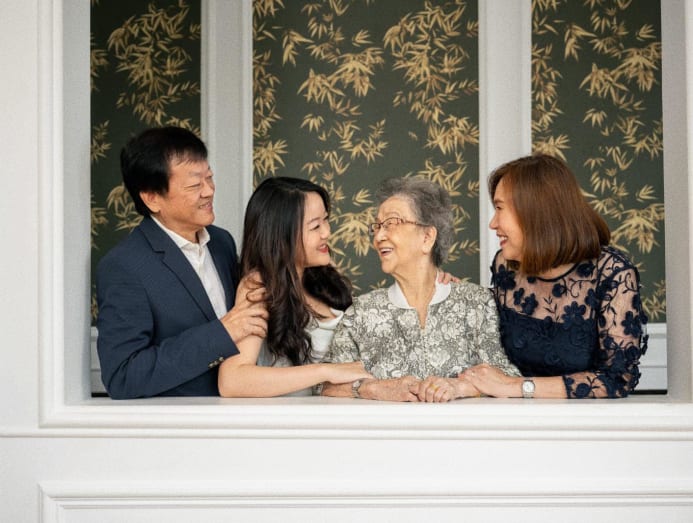When love becomes control – what the hottest K-drama today gets right about family and sacrifice
In many Asian cultures, the concept of “family first” is often ingrained in people from an early age. Ms Nicole Chan examines what this really asks of individuals – love and respect or blind submission?

Left: A still from South Korean drama When Life Gives You Tangerines. Right: A baby photo of Ms Nicole Chan featuring her father Chan CH and her mother Janet Lim. (Photos: Netflix, Nicole Chan)

This audio is generated by an AI tool.
Like many Netflix subscribers, I’ve spent the last few weeks captivated by the South Korean drama series When Life Gives You Tangerines. Along with the rest of the people on my TikTok feed, I ugly-cried my way through all 16 episodes of the quietly devastating drama about love, grief and intergenerational trauma.
But beyond my tears, I found myself relating to the invisible struggles of the series’ protagonists Yang Gwan-sik (played by actor Park Bo-gum) and Oh Ae-sun (singer-actress IU), who spend decades carrying the harmful, sometimes toxic, weight of family expectations and pressures.
In many Asian cultures, family harmony is often held up as the thing to be preserved at all costs. The concept of “family first” is often ingrained from an early age – at dinner tables, holiday gatherings and in moments of conflict.
As I get older, though, I find myself questioning what this phrase really asks of us.
It’s meant to instil loyalty, responsibility and the idea that no matter what happens, family is our foundation.
And yet, when an elder makes a hurtful comment? Let it go. A family member treats us unfairly? Don’t confront them.
So whenever we invoke “family first”, are we fostering relationships built on mutual respect or are we simply demanding compliance in the name of tradition?

DOES LOYALTY MEAN ACCEPTING MISTREATMENT?
Many years ago, a close relative of mine married into a traditional family, one that prides itself on tight-knit bonds and unwavering loyalty.
Yet from the moment she entered, she felt like an outsider. She wasn’t from the same place and didn’t speak their “language”, both metaphorically and literally.
She found herself on the receiving end of subtle jabs, criticisms and constant judgment, much like Tangerines' heroine Ae-sun did when she married into Gwan-sik’s family.
No matter how hard she tried, she remained on the fringes. When she tried to set boundaries, she was met with cold disapproval. Instead of being welcomed, she was tolerated.
The message was clear: She would never truly belong.
In traditional family structures, in-laws are often expected to assimilate rather than be accepted on their own terms, a 2008 study found. When they resist or express discomfort, they are frequently labelled as “difficult” or “not understanding family values”.
A 2022 study also found that couples who are not on the same page regarding their relationships with in-laws tend to experience more stress and conflict, which can ultimately harm marital stability.
For another friend, the betrayal was financial rather than social. While working in Singapore, her father had entrusted their family property in their home country to a cousin.
That trust was shattered when the cousin sold the house for personal gain. To this day, he has neither returned the money nor offered a proper apology.
In both these cases, what is “family first” supposed to look like? Does it mean staying silent in the face of mistreatment? Where do we draw the line?
"FAMILY WILL ALWAYS BE THERE"?
Perhaps many of us conflate “family first” with the idea that “family will always be there”.
This is comforting in theory but doesn’t always work out in reality.
Another friend grew up under immense pressure as the only grandson in his family. From a young age, he was expected to uphold traditions, show unwavering devotion to the paternal side of his family and adhere to impossible standards of perfection.
Every small mistake – the kind of harmless mischief children and teenagers so often get into – was met with harsh criticism.
As he got older, the weight of that judgment only grew. The constant scrutiny has shaped the way he navigates relationships with others.
He struggles with feeling like he is never good enough, always second-guessing his worth not just within his family but in every aspect of his life.
He tends to get defensive, even in situations where there is no direct criticism. It was an instinct honed by years of bearing the brunt of judgment and disapproval, spoken and unspoken.
His is not an isolated experience. Studies show that people who feel like outsiders in their own families – whether due to gender roles, favouritism or differing values – are more likely to struggle with long-term emotional distress, including self-esteem and mental health issues.
Some family ties become sources of pain rather than support.
Some relationships become transactional, where love is conditional and acceptance is only given to those who comply unquestioningly with the rules.
THE WEIGHT OF TRADITION
I’ve had my own experiences feeling like an outsider in certain family settings, where my individual choices or opinions didn’t align with the group’s norm.
My parents grew up in a time when “family first” was synonymous with obedience: Elders set the tone and younger generations follow without question.
They’ve shared with me stories of duty and sacrifice, how their parents and grandparents worked tirelessly, often at the cost of their own happiness, to keep the family together.
Collective stability was always first; individual needs came second.
This theme plays out in When Life Gives You Tangerines as well, where Ae-sun and Gwan-sik relinquish everything, from their boat to their house, to provide their children with education and a stable future.

My parents’ mindsets were common in a post-war world where survival was paramount and family unity meant economic security.
Expressing dissent, asserting boundaries, or prioritising personal happiness was often perceived and criticised or dismissed as selfish. Pursuing personal desires or questioning an elder’s authority was unthinkable.
Thankfully, my grandmother wasn’t like the rigidly tradition-bound matriarchs in Tangerines. She chose to put love over pride, never held grudges and has long been a role model of compassion for my parents and myself.
Now, as my parents are ageing into roles as senior family members themselves, I’ve noticed a shift in their thinking.
They now see that blind loyalty doesn’t always equate to love and that forcing unity can sometimes fracture relationships instead of strengthening them.
They’ve seen how the pressure to conform or obey can create resentment rather than closeness.
One of the biggest lessons my parents learnt in recent years is that love and control cannot coexist. A relationship built on obligation is fragile at best and oppressive at worst.
True family loyalty, they’ve come to realise, is not about maintaining appearances.
It’s about creating a space where each member feels safe, valued and free to be themselves.

REDEFINING "FAMILY FIRST"
American writer Richard Bach once said: “The bond that links your true family is not one of blood, but of respect and joy in each other’s life.”
Family will always be an important source of security for us as individuals, but what that security looks like has changed.
Today, security is no longer just about putting food on the table. So much more matters now: Mutual respect, open conversations and the freedom to be ourselves without fear of rejection.
Family shouldn’t be a template we have to fit into at all costs. It should be a space where we can find safety and comfort regardless of the expectations we don’t fulfil or beliefs and norms we don’t share.
Some will argue that this shift threatens the fabric of family unity. But what good is the facade of unity when, in reality, people we love feel unseen and unheard?
If we continue using “family first” as a way to enforce outdated hierarchies, we risk perpetuating cycles of harm that hurt all of us.
Instead, can we redefine it as a commitment to mutual respect and growth?
This, I believe, is how we can pave the way for stronger, healthier family bonds – not just for ourselves, but for future generations.
Nicole Chan is a communications strategist with a passion for topics relating to social impact, intersectionality and pop culture.
If you have an experience to share or know someone who wishes to contribute to this series, write to voices [at] mediacorp.com.sg (voices[at]mediacorp[dot]com[dot]sg) with your full name, address and phone number.












